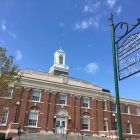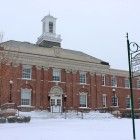Footer Featured Widget
‘The Change in Our Community’: Facing Criticism of Sewer Fee Proposal, Finance Board Postpones Vote
|
Russ Barksdale, president and CEO of Waveny LifeCare Network, received notification this week about $8,5000 in annual sewer usage fees that the nonprofit organization would be expected to pay for the fiscal year starting July 1. A proposal from Town Hall that’s designed to more fairly distribute sewer-related costs among residential and commercial property owners, the fee ultimately would see both for-profit and nonprofit businesses—including churches, charitable organizations and municipal buildings—taxed for water usage for the first time.
Barksdale in addressing the Board of Finance on Tuesday night during a public hearing on the proposal said he found that his organization, which includes both the Waveny Care Center on Farm Road and The Inn on Oenoke Ridge, would be “hit more than any other nonprofit in our area, sizably more than any other nonprofit.”
“I went to then think of the pebble effect, the pebble effect that it would have for that usage fee to be placed on us as a nonprofit, to be placed upon the other churches and other nonprofits that enrich the culture of this great community that we have in New Canaan,” Barksdale said during the well-attended hearing, held at Town Hall.
Noting that Waveny has provided some $10 million in charity care in the past two years in ways that saves government spending, Barksdale added, “We have a very fragile, very large group of seniors that come to us who cannot afford or find themselves at the end of being able to afford the highest level of care that we provide. And so I applaud our charity care to provide that. Who do we bill that usage fee to?”
Medicare and Medicaid are not options, he said, and there’s “really no place to pass that fee on to others to be able to incorporate, so we have to as a nonprofit be able to absorb that expense.”
“We would just ask that, similarly to the $15 minimum wage, that you give us an opportunity and all the nonprofits that are here the opportunity to build it within our budget. Right?



